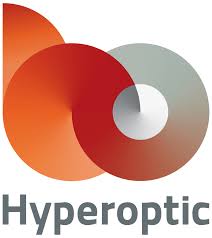With broadband, too much is not enough, and the safe harbour of status quo will not meet the ever-expanding needs of the market.
Trefor.net is pleased to present the following “Broadband Week” post from Hyperoptic Managing Director Dana Tobak. “Rise of the Gigabit Cities” is Dana’s first contribution to the site.
Everyone has moments in his or her career that they can’t forget – for me, one such moment was during the press conference in 2005 at which Be Broadband was launched. We were incredibly excited to be the first provider to take advantage of Local-Loop-Unbundling and offer 24Mbps to consumers, the fastest broadband speed available on the market at that time. During that press conference a journalist raised their hand and asked me, “is there really any need for 24Mbps? Will anyone ever need speeds that fast?”
The question took me by complete surprise, illustrating that some people didn’t understand — and still don’t — the need to innovate and challenge the status quo. Fast-forward nine years, and with our new venture Hyperoptic we are now offering consumers and businesses 1,000Mbps (one gigabit per second). And we aren’t alone. 2014 has definitely been the year of the gigabit cities in the UK.

So why do we need gigabit cities — cities whose broadband infrastructure is predominately fibre-to-the-home (FTTH) — and what is fueling the expansion? A lot of people think that the rise of the gigabit cities started with Google Fiber in Austin, Texas, but it actually goes much further back.
In the UK there is massive confusion in the market regarding what ‘fibre’ broadband actually is. The reason for this confusion is that the big providers have muddied the waters by marketing their services as ‘fibre’ broadband, even though the fibre actually stops at the cabinet and the connection into the house is delivered over telephone copper cables. And of course, this has definitely contributed to the UK being slow to join the gigabit cities club. Businesses and consumers think they are getting full fibre broadband, but in truth they are getting fibre-to-the-cabinet (FTTC).
We believe that the UK is a market that can hugely benefit from Hyperoptic’s full fibre approach – after all, the UK has the most Internet based economy of the G20, contributing 8.3% to the UK economy. From our experience with Be Broadband, however, we knew going in that there would doubters who would question why anyone would need a gigabit FTTH broadband when FTTC broadband can deliver speeds up to 76Mbps (the key phrase here being “up to 76Mbps” – because there is the copper component, consumers and businesses are subject to an undependable performance, peak-time slowdowns and barriers to fully utilising their connections).
Educating the market hasn’t been easy. Many people still don’t understand that there is a better way and that once they get FTTH, broadband becomes an indispensable service on which they can truly depend. Other countries have been quicker to innovate and create a network of gigabit cities. For instance, China and Japan currently have 37 million and 24.7 million FTTH subscribers. Also, thirteen countries in the EU have experienced growth greater than 30% in subscribers in the past year, with France and Sweden now each exceeding1.2 million FTTH subscribers.
Currently the UK isn’t even figuring on FTTH rankings, but this is starting to change. Hyperoptic launched in London in 2011, and has since then passed 35,000 homes in the Capital with recently announced availability in Manchester, Liverpool, Leeds, Cardiff, Bristol and Reading. Sky, TalkTalk and CityFibre have joined together and will soon launch gigabit broadband in York (City Fibre has also said that it will be launching 20 new gigabit cities by 2016).
The UK may have been slow to start, but now the gigabit cities are growing apace. Industries are becoming increasingly digitised, and we are changing the way that we consume media and entertainment (with online streaming only set to increase). The status quo will no longer suffice, the time for doubting is over.
